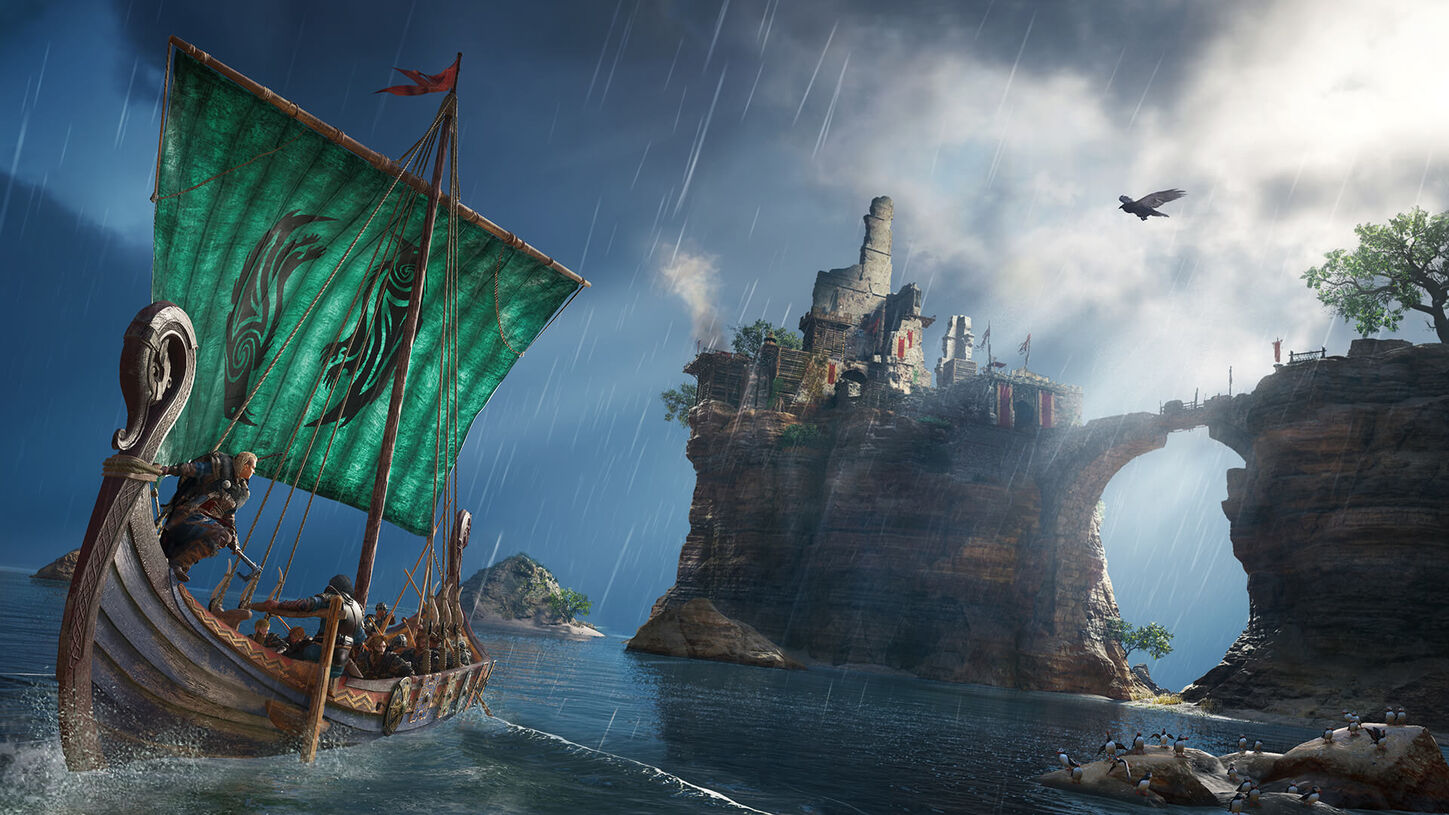This week the news broke that Ubisoft is developing Assassin’s Creed: Infinity, a massive online platform that evolves over time. But what does this mean for the future of one of the most popular historical video games ever?
AC: Infinity
Well… to be fair, answering that question will require some speculation. Still, thanks to investigative reporting by Jason Schreier (Bloomberg; beware the paywall) and anonymous sources at Ubisoft, we know quite a bit more than we were supposed to know about Infinity at this point. In a rare move by the publisher, the news was also almost immediately confirmed by Ubisoft in a blogpost.
So, what do we know about AC: Infinity? Well, it seems the name is well-chosen as it will expand to numerous other past places. Schreier’s sources described it as follows:
Infinity will contain multiple settings with room to expand to others in the months and years following its debut[…]. Individual games on the platform might look and feel different, but they will all be connected.
In a reaction to the piece and in their own blog the game development company only speaks of “an opportunity for one of Ubisoft’s most beloved franchises to evolve in a more integrated and collaborative manner” to “exceed the expectations of fans who have been asking for a more cohesive approach.”
Integrated and collaborative and cohesive… that sounds nice, right?
Ubi’s Organizational Chair Dance
First of all, these terms describe Infinity as much as the organization that will be behind it. This move for the franchise seems to be at least partially prompted by an organizational reshuffle. As a result of this Ubisoft Montreal and Quebec, two of its largest studios, will start working closely together. For the last couple of entries, the studios were taking turns on developing successive installments in the AC series — and were, according to Schreier’s sources, even a bit unfriendly in their competition with each other.

The Ubisoft blog also lists a lot of movement of Ubisoft staff to new positions. This may be noteworthy in terms of internal organizations. It could even be seen in light of last year’s news about the toxic work environment at Ubisoft — an issue which has not been fully dealt with, according to some. Regardless of the exact organizational dynamics behind this integration, ultimately, it is not very likely that many players will notice the result of this process directly. What it does mean for players is that the AC series will stop coming in separate installments and become a service game.
History is Our Infinite Playground
If you do not know what games as a service are, bless your heart. Basically, they are games that never stop. That seems fun, right, an Assassin’s Creed that never ends? In a way, sure! I’ve spent hundreds of hours in these games and look forward to spending many more.
However… this also means that Infinity will never stop asking for your money. How this looks is unclear, as of yet. It could take the form of a push to get more people into Ubisoft’s subscription service, Ubisoft+. It could also take the shape of micro-transactions or endless bits of paid DLC, or a combination of the above.
One thing is for sure: Ubisoft is doing this because it would like their flagship series to generate even more profit. While part of this may be about cutting production costs (which could explain the team reshuffle), games as a service are also more profitable, because people simply spend more money on them. In short, those of us who want to see all the past goodness that this new AC game has to offer, should, on average, be preparing to pay more, not less.
Secondly, while Valhalla has been a big commercial success and was generally well-received by critics and fans, one often heard critique on the game is that it is just too long. While it is gorgeous and rich in historical detail, I actually don’t want to continue my playthrough because of the inordinate amount of time it will ask of me. So, I, for one, would really like AC games to become smaller again.
Yet Infinity will almost be guaranteed to be another big, RPG-style game or series of games. This means level-locked areas and other forms of content gating. It will likely also offer more content at the start than even Valhalla had and it will continuously get updated. Infinity is quite literally not really meant to end and I am genuinely already getting tired just thinking about the endless grind that awaits me, if I want to see what it has to offer.
Historical Education as a Service
History education won’t be the first thing people think about when they hear about a new service game. Yet this too may be impacted, if Infinity also includes a Discovery Tour.

As someone who likes the idea (though not always the execution) of its nonviolent explorations of the past, the Discovery Tour has been a welcome addition to the franchise. It could be even greater if it would move to a free-for-education or much more inexpensive, standalone piece of software with clear licensing for educational purposes. The first Discovery Tour is currently still a whopping 20 euros on the Ubisoft store and needs to be bought on what is, in principle, a personal account that is not really meant to be used for organizational purposes.
The future I would really love for the Discovery Tour is for (parts of) it to go Open Source! This would allow scholars, educators, and history fans to truly make it this widely accessible and updateable tool. This is not going to happen, I know, but a man can dream.
What is happening is that the upcoming Discovery Tour that will be offered as part of Valhalla, is really moving forward in terms of it being a much more engaging and immersive experience than the previous two. Yet the fact the Discovery Tour is getting more engaging and immersive is, in a way, bad news if it becomes part of a service game.
The whole idea of games as a service is that the service becomes a big or even the main money and time sink for whoever is using it. If you extrapolate this idea to history education with the Discovery Tour, this means schools or students will need to spend continuously to be able to access it. It may not feel like we will be spending a lot of money on Infinity,— just monthly or irregularly, small amounts —, but this is exactly how these subscription and micro-transaction services get their hooks into our wallets and soon maybe even our schools’ budgets.
What is more, as money and time will be continuously spent on and in Infinity, it could become a platform to which history educators may become inadvertently bound. Compare Infinity to an online store subscription, like Amazon’s devilishly, business-smart Prime: why shop elsewhere than Amazon if you’re already paying for its Prime service? For an Infinity Discovery Tour, I can foresee a similar reasoning taking shape in future educational board rooms: “Should we even go on a field trip to a museum if we are paying for that perfectly good Infinity thing?”
My point is, while the Discovery Tours are solid and enjoyable in many ways, they really should just stay an extra(-curricular) opportunity for historical learning, not press it into service.
Ad Infinitum?
Don’t get me wrong, Ubisoft is not some shadowy evil organization like AC’s Abstergo. As a publicly-traded game company, it ‘simply’ needs to make more money for its shareholders. To do this, Ubisoft needs to focus on what its core customers want. At the same time, it will also need to keep growing its audiences.
This could mean that Infinity will be a much better AC than its previous iterations. The exclusive focus on endless RPG-grinding and manslaughter could become a thing of the past. Infinity could become like a nicer version of the Animus, a tool that is at our disposal to access the full breadth and diversity of the past when we want. If so, it would come with a monetization strategy that is flexible and fair for its diverse users. It could even herald a renewed, open and collaborative relation with scholars and others who could collaborate with the studios, who are surely in need of more expertise to flesh out all of its diverse pasts. As I said, a man can dream!
Yet even if Ubisoft had actually turned into Abstergo, it does not mean that an AC: Infinity move to control our purses, life, and ideas about the past would be successful. In fact, as a scenario more likely than the ones above, I feel Ubisoft may be reading the room wrong. Yes, (unfortunately) service games may be the future for games and Valhalla is a big hit. Does that mean that players really will want to pay to play in AC’s past playground ad infinitum? I really think not.
I am, however, happy to be persuaded, so please share your thoughts about Infinity with us using the medium of your choice!

Angus Mol is an assistant professor at the Leiden University Centre for Digital Humanities and the Centre for the Arts in Society. A Dutchy and previously a Caribbean archaeologist, he still likes Piña Coladas and walks in the rain, but now spends his days teaching digital tools and thinking to Humanities students, his evenings by playing games with his daughter or exploring the past in his game-fueled Time Machine, and his nights dreaming about having as luscious a beard as Aris. Tweet words to him @theshoresoftime.
